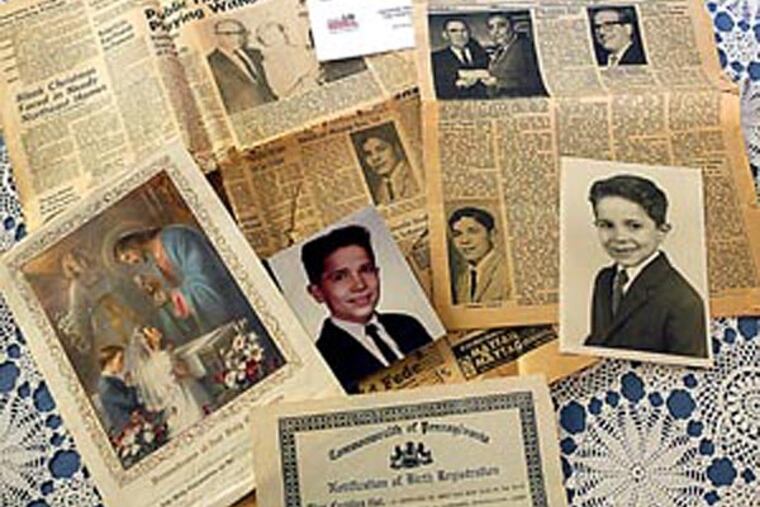A cold case, a sister's final hope
After nearly 50 years, the sister of a missing Philadelphia boy still hopes to bring her brother home.

JOANIE HESS hopes for bones.
Hess, whose younger brother Anthony Tumolo was 14 when he vanished from a Philadelphia street in 1966, has long accepted that he'll probably never be found alive.
But after nearly five decades, she still hopes to bury him with the parents who prayed for his return.
"Because of the length of time, it's only realistic for me to believe that he is now deceased," Hess said. "He was small for his age, but not frail. I would think he would have fought his way out of a situation if he could. Right now, all I want is that his remains be identified and brought back to us for a proper burial."
Hess, a retired nurse who now lives in Anaheim, Calif., understands how the miraculous rescue of three Cleveland women could bring renewed hope to families of missing loved ones. But it mostly reinforced her belief that time has done little to improve the way missing-persons cases are handled.
"On the surface, hearing about the women gives hope that many more victims could be rescued from these perverts," she said. "But it also revives an old wound. I wonder if something could have been different in my brother's case if police took it more seriously."
Cleveland police, who were criticized in the past for failing to properly investigate disappearances, are being blamed again for missing clues about the rescued women. Michelle Knight, the eldest and longest-held of the three victims, was quickly labeled a runaway, and seemingly forgotten.
So was Hess' brother. Hess said police stopped looking for him after they concluded that he ran off following an argument with his father about giving up his paper route to concentrate on his studies. The city's papers didn't write about his disappearance.
"I learned all about hopelessness and powerlessness when police refused [to believe] that our brother could be anything other than a simple runaway," Hess said. "I think the cops looked through our door, saw our old furniture and thought we were just some dregs, and washed their hands of it."
Hess, one of nine children, was a student at Penn State University when her brother vanished from their Tacony neighborhood. Her parents, hopeful that the police were right about him eventually turning up, waited more than a week to tell her he was missing. And even then, Hess said, they wondered if maybe he'd gone to the school to visit her. Hess wasn't sure what to think back then, but over the years, she began to believe that her brother was targeted by a child predator.
"I think the first thing people do is try to deny the possibilities," she said. "People are trying to protect themselves, because we don't want to deal with the horrible things that happen."
Hess called and wrote police with little or no response. But about 10 years ago, while in town for a relative's funeral, she prepped her husband. She was going to the police department. She wasn't leaving without getting some answers. He should probably have a lawyer's number handy.
It didn't get that far. Officers from the city's special victims unit sat with Hess and walked her through one of the city's oldest missing-persons cases. The original paperwork, which wasn't more than a sentence or two on an index card, had been purged, she said. But they listened and collected all the information she had. An officer quoted in a 2008 story by my Daily News colleague Dana DiFilippo said the Tumolo case was one that stuck with them.
Since then, Hess and her siblings have submitted their DNA to the National Center for Missing and Exploited Children, and Tumolo's missing-person profile has been updated with age-enhanced photos.
A few years ago, Hess heard about some bones that were discovered in Philadelphia. She and other family members were hopeful that they were Tumolo's. "We thought, finally, we can put all of this to rest." But they weren't his.
So Hess and her family continue to hold out hope for an ending to a mystery that has defined and haunted her family for nearly 50 years. She doesn't expect a Cleveland-like miracle, but she does check in regularly with the Philadelphia police.
"It's my way of saying, 'Don't forget my brother. He's still a case of yours.' "
Phone: 215-854-5943
On Twitter: @NotesFromHel